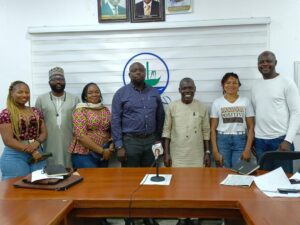
Joyce Mmereole Okoli
Shipowners and importers are losing millions of dollars due to prolonged investigations related to drug trafficking and stowaways on vessels, according to the Maritime Security Providers Association of Nigeria (MASPAN).
The organization’s recent revelation highlights the urgent need for an overhaul of the legal and regulatory frameworks governing such cases in West African nations, including Nigeria.
During a press conference held at the Maritime Reporters Association of Nigeria (MARAN) secretariat, Emmanuel Maiguwa, Chairman of the AMANO/MASPAN Planning Committee, expressed concerns over the financial and operational toll these incidents take on the maritime industry.
Maiguwa explained that ships can be detained for weeks or even months as authorities investigate the origins of drugs or stowaways found on board. This extended detention period leads to significant financial losses for shipowners, costs which are often passed on to importers using their services.
MASPAN believes these complications contribute to the exorbitant war risk charges imposed on importers in West Africa, despite the absence of piracy incidents in the Gulf of Guinea for the past two years.
Furthermore, the association noted that the lack of legal clarity surrounding these cases discourages seafarers from working in the region, fearing harsh consequences from prolonged detentions.
In response to these challenges, MASPAN, in collaboration with the Alumni of Maritime Academy of Nigeria, Oron (AMANO), is organizing a summit aimed at addressing Nigeria’s capacity to manage drug trafficking and stowaway investigations more efficiently.
The summit, scheduled for August 22, 2024, at Eko Hotel, Victoria Island, Lagos, will be chaired by the Honourable Minister of Marine and Blue Economy, Gboyega Oyetola. The event aims to bring together shipping industry stakeholders and relevant regulatory agencies to develop strategies that could resolve such cases within 24 hours, a standard achieved by other nations.
Maiguwa, who also serves as the CEO of Bricks Limited, a maritime security firm, stressed the urgency of finding solutions. He recounted instances where ships were detained for months, with crew members forced to remain without seeing their families for years while under trial.
Additionally, he highlighted the disruptions caused by stowaway cases at Lagos ports, which result in vessel delays and increased costs.
“These activities not only disrupt shipping operations but also traumatize seafarers and hinder Nigeria’s potential as a leading maritime nation.”
“Our goal is to ensure that drug and human trafficking in the maritime domain are drastically reduced, if not eradicated, and that innocent parties are not unjustly penalized,” Maiguwa said.

